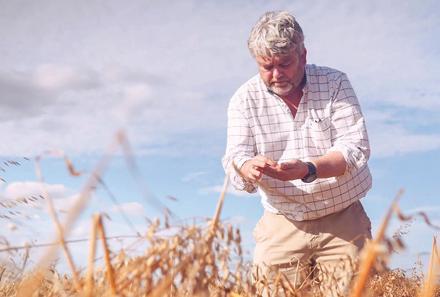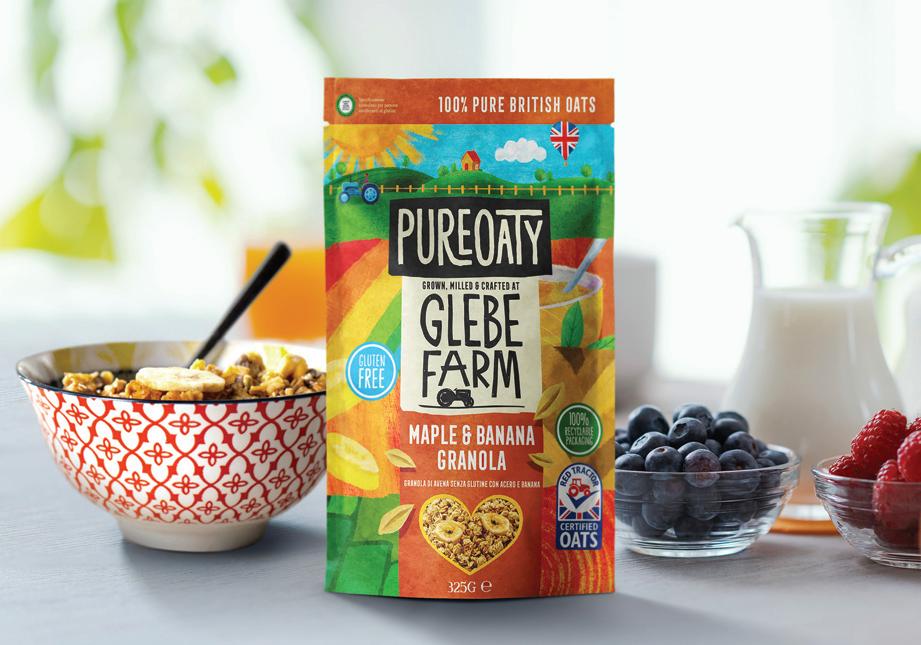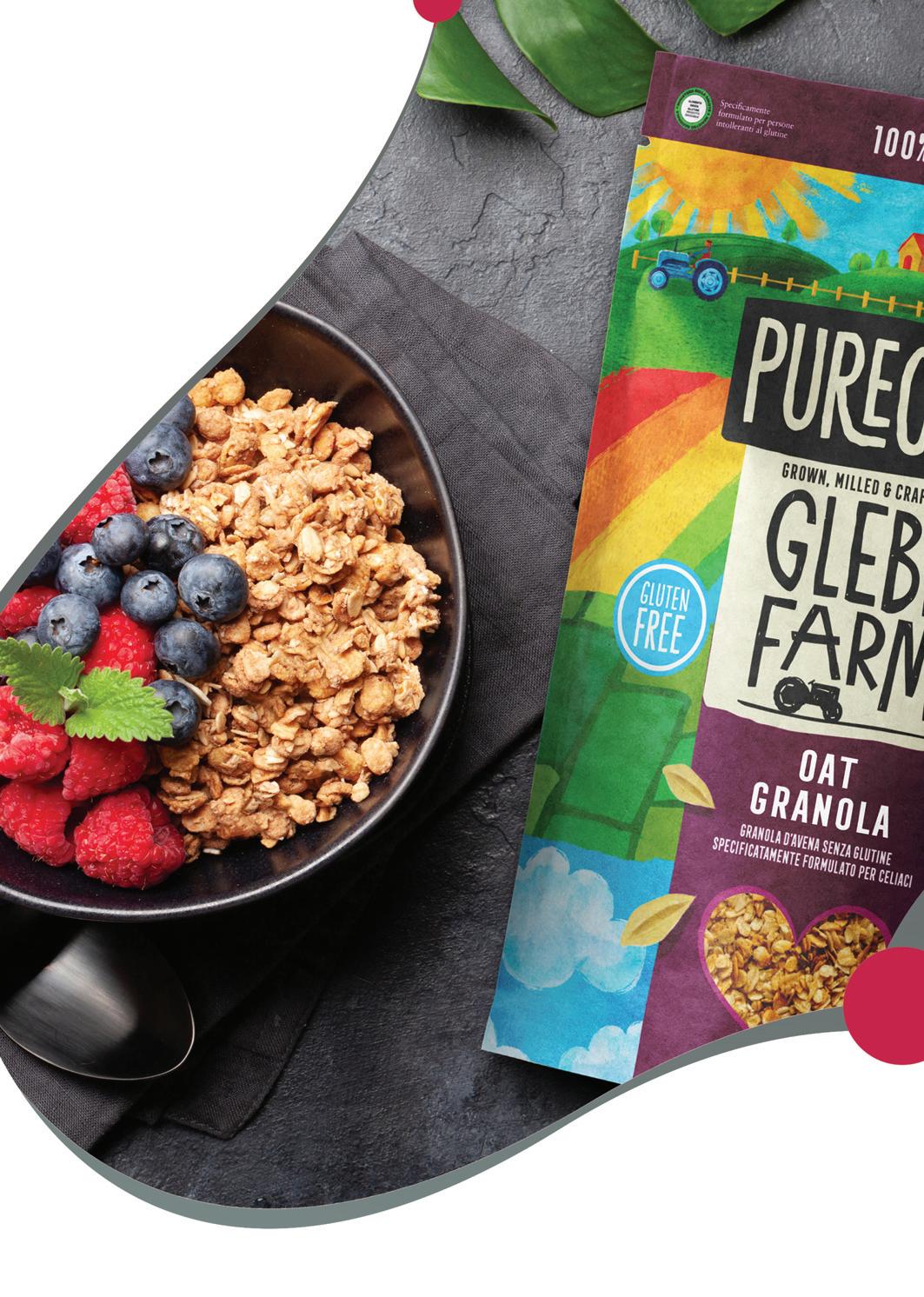











Glebe Farm Foods is an independent British business, known for the purity of its gluten-free oats and quality of its oat drink, among other things. The Cambridgeshire-based, family-owned company is committed to doing things a bit differently. Hannah Barnett spoke to Philip Rayner, Owner & MD, to learn more.
Supplying across the industry, from international brands to small bakers and consumers, Glebe Farm Foods is riding the wave of plant-based milk alternatives and free-from products by putting its own stamp on things.
The company is the premier supplier of gluten-free oats throughout Europe and reaches markets around the world. Glebe is also the only business in the UK growing and processing gluten-free oats into oat flakes, flours and the company’s awardwinning oat drink range, PureOaty.
“We’re the only brand making its own oat milk in the UK,” said Owner & MD Philip Rayner. “We are completely vertically integrated, from the farming through to making our oat drink. This means Glebe offers the most sustainable oat beverage, probably by a factor of two in CO2, in the UK market.”
The land, ‘Glebe’, in Kings Ripton, near Huntingdon, was bought by Philip Rayner’s parents back in the 1970s. In 2000, his sister, Rebecca Rayner, founded Glebe Farm Foods. “In her heart, she had a vision to take the crops we grew and make them into consumable products delivered right to the customer, which is an ethos that
has carried on through the next 25 years,” said Philip Rayner.
The company began producing guaranteed gluten-free oats in 2010 and was the first in Europe to do so. “The market was ripe, we happened to be growing oats at the time,” Philip Rayner reflected. “We built the gluten-free oat mill and spread our product throughout Europe. It became a bit of a revolution.”
Glebe Farm Foods operates from a five-hectare site with an oat mill, granola baking, oat drink manufacturing and a Tetrapak aseptic packing line. The company’s reach is significant, “about a million breakfasts a day,” as Philip Rayner put it.
People with coeliac disease must typically avoid eating ‘standard’ oats because these are contaminated with other cereals that contain gluten, such as wheat, barley, rye and spelt from growing or milling. Glebe Farm Foods is known for producing oats that are undetectable in gluten and around 100 times purer than the 20ppm gluten regulation.
“Our Gluten-free oats are about 100 per cent purity, hence the name of our drink,
PureOaty, “said Philip Rayner. “We are confident there are no foreign grains present in the oats. And to achieve that, the farming is absolutely pure, and our processes engineer out the risk of contamination so it can never occur. That’s what we’ve built over the last 15 years –giving our customers complete reliability.”
The company tests every tonne of grain to ensure no wheat or barley is present and does it seven times during the process. This allows Glebe Farm Foods to exceed gluten-free specification demands with a long-term average better than 100, or 1,000 times purer than the worldwide 20ppm regulation.
“Our customers have no complaints,” Philip Rayner said. “And that is due to the absolute purity we deliver every single time, with every single bag. This makes a difference to the lives and health of our end-users.”

To ensure the oats are fully gluten-free, strong relationships with the company’s suppliers are vital. Glebe Farm Foods is supported by a 100-farmer strong network and about 100,000 acres of farmland.
“These farmers are our superpower,” Philip Rayner said. “One massive advantage we have is our relationship with them. Companies often say that sort of thing, but we understand what they’re doing because we farm ourselves and we reward them for farming well, in terms of purity. That understanding and communication is the key starting point in our relationship. Also, many of the farmers we work with are very local and have been working with us for many years.”
Over the last decade, Glebe Farm Foods has invested heavily into production, “probably £25 to £30 million,” according to

Philip Rayner. Most recently, the company invested over £12 million into an oat milk plant with a Tetra Pak aseptic packaging line, completed last year.
Glebe Farm Foods has also built an innovative biomass boiler for its oat mill, using oat husk residues to generate steam, meaning it does not use fossil fuel heat for the flaking of oats. “The heaviest power demand is for heat, and we’ve removed that,” Philip Rayner said. “We’re


using a completely circular process.”
To appeal to still wider markets, the company is also set to launch a new oat drink, specially designed to go well in tea and satisfy British tea drinkers, called Tea-iffic.
In terms of responsible and regenerative farming, Philip Rayner outlined a tried and tested strategy. “When moving to more sustainable farming practices, we can’t force everybody to go organic, because they’re not going to do that,” he explained. “However, introduce something that’s economically viable and works well, then it can easily happen on its own.
“We’ve got a fantastic farmer cohort, who will try new things. That’s how we ended up doing gluten-free oats. We’ve got several farmers growing beans or peas within oats, which has shown to have potential to give sustainable yields with a lot less nitrogen fertiliser, which is the main cause of carbon in grain crops.”

The company has a successful long-term partnership with Morrisons, where it has a high rate of sale and has just expanded by another 50%. Glebe Farm Foods products can also be found in English Heritage properties, such as Stonehenge, and on British Airways flights.
Another fruitful partnership is with Imperial London Hotels, developing with Glebe to use oat milk, granola and porridge as part of the hotel’s daily breakfast buffet. Especially here, both companies work together earlier in the supply chain because Imperial London Hotels has farms also growing oats for Glebe.

“It’s a wonderful link,” Philip Rayner reflected. “And a very sustainable way of doing things. It means the hotel can explain the provenance of the products to guests – and be thoroughly involved. It’s a fantastic pleasure to work with customers like that.”
Having tripled the size of its plant over the last 12 months, Glebe is planning to grow by 25% annually over the next few years and has the ambition to double in size thanks to broadening its product range, including a recent foray into innovations in oat milk powder to make ice cream, non-dairy chocolate and many other products. Powders are favoured in ice cream production and for export due to being easier to store and transport.
For Philip Rayner, being involved in the cutting-edge of invention is all in a day’s work.

Owner & MD, Philip Rayner

“I spent 20 years as a technology developer, so what really drives me is innovation,” he concluded. “I like developing new things, finding clever ways of doing stuff and building the business at the same time. I don’t do business just for money. I do it because I enjoy working with customers and knowing that we’re making differences to people’s lives with our gluten-free products.”



